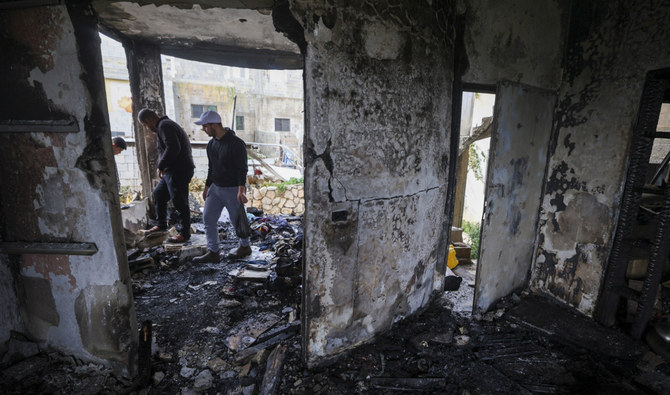
Former Israeli Attorney General Avichai Mandelblit was on the receiving end of a great deal of criticism for much of his tenure. Some might argue that he must have done something right to face disapproval from all political camps, much of the media and other segments in society. But I would like to add one further layer of criticism as he leaves the public stage at least temporarily — and it concerns Mandelblit’s endorsement and legitimization of lawbreaking, which is not something we expect from one of the most senior figures in charge of upholding the laws of the country.
Undoubtedly, Mandelblit, who left office on Feb. 1, was extremely meticulous in fulfilling his duties throughout his six years of heading up the legal system of the executive branch and of the public prosecution, even if he was, by all accounts, too lenient with politicians who went astray and engaged in corruption. However, when it came to the Occupied Territories and Israel’s treatment of the Palestinians, he suffered from a severe legal and moral blind spot. In one of his last acts in the job, Mandelblit approved a deal authorizing the resettlement of the outpost of Eviatar in the West Bank, which is the focus of this specific irritation.
According to the Israeli organization Peace Now, there are currently 140 outposts in the West Bank, in addition to 132 settlements approved by the Israeli government. From an international law perspective, there is no difference between these two types of community. Article 49 of the Fourth Geneva Convention states: “The occupying power shall not deport or transfer parts of its own civilian population into the territory it occupies.” In addition, international law also prohibits the confiscation of private property. This makes the entire settlement project, with its approximately 600,000 Israeli residents, illegal.
However, when it comes to the Palestinians, Israeli law entirely ignores international law and has its own definitions regarding the legal status of the lands it occupied in the war of 1967. East Jerusalem, for instance, was annexed and hence Israeli law applies to it, even though its Palestinian residents do not enjoy the same rights as their Jewish neighbors. Similarly, Israeli law was applied to those parts of the Golan Heights that were taken from Syria and occupied.
As for the West Bank, the 132 settlements where the vast majority of the Jewish settlers live are regarded by Israel as legal because they were approved by the government, while the outposts, which are usually small in terms of population, are regarded as illegal even by the Israeli authorities. Those who live there represent the most extreme and dangerous factions of the settler movement. They treat the territory as if it were the Wild West Bank, where they are the sheriffs. Most of these outposts contain makeshift structures aimed at creating features on the land that would be difficult, if not impossible, for the Israeli authorities to dismantle under any circumstances.
Eviatar encapsulates much of the debate over settlements, particularly the issue of outposts. It is about a small segment of Israeli society that has been given the liberty to operate outside of legal norms. It is about a political agenda that has been hijacked in order to destroy not only the chance of peace based on a two-state solution, but also any sort of peaceful coexistence between the two peoples. It is about utter contempt for the Palestinian population and their rights. It is about the Israeli government’s lack of any authority over the extreme and violent elements within the settler movement. It is about a complete disregard for international law and being a constructive member of the international community. And it is about the lack of any strategic vision for relations with the Palestinians and consequently the future of Israel as a democratic state.
At this point in the history of the Israeli-Palestinian conflict, allowing the outlaws of Eviatar to return to the scene of their original crime — regrettably with the blessing of the Israeli government — is also a reflection of the current government’s weakness when it comes to dealing with the Palestinians. Back in May last year, a group of settlers illegally set up the new outpost of Eviatar, near the Palestinian village of Beita, just a month before the new government was formed. Defense Minister Benny Gantz then negotiated a compromise with them, which included a temporary evacuation of the locality in return for an Israel Defense Forces team being stationed there to guard the structures they had created until the status of the land was confirmed. This deal completely ignored the Palestinian farmers of nearby Beita, whose access to the land where they grow olives was now blocked by Israeli soldiers. During the protests by Beita’s residents against this injustice, the security forces responded by killing nine of them and injuring dozens of others. If the decision of the former attorney general is implemented, the destruction of these Palestinian farmers’ livelihoods will become permanent.
This issue highlights the Israeli government’s lack of any authority over the extreme and violent elements within the settler movement.
Yossi Mekelberg
Foreign Minister Yair Lapid has rightly warned that this so-called compromise between the settlers and the government will negatively impact Israel’s relations with the international community, especially its ties with the US, arguing that he had already been warned of this by a senior American official. However, it is the very act of negotiating with offenders regarding how to make their crime legal with the help of the state that makes the government an accomplice to their criminal activity. And this will no doubt encourage the erection of further outposts wherever a group of settlers decides would be most disruptive and damaging to relations with the Palestinians.
Law-abiding Israeli citizens must ask themselves why they cannot follow the same pattern of behavior anywhere inside Israel proper, as the law has come to mean very little nowadays, having been reduced to a mere suggestion, while eroding the standing of the country across the world. It is time for the Israeli government to get a grip on the situation and stop the hooligans of the outposts from dictating its policies, while dragging the country down with them into the unholy combination of immoral, abusive treatment of the Palestinians and confrontation with the world.
Yossi Mekelberg is professor of international relations and an associate fellow of the MENA Program at Chatham House. He is a regular contributor to the international written and electronic media. Twitter: @YMekelberg
Disclaimer: Views expressed by writers in this section are their own and do not necessarily reflect Arab News" point-of-view










